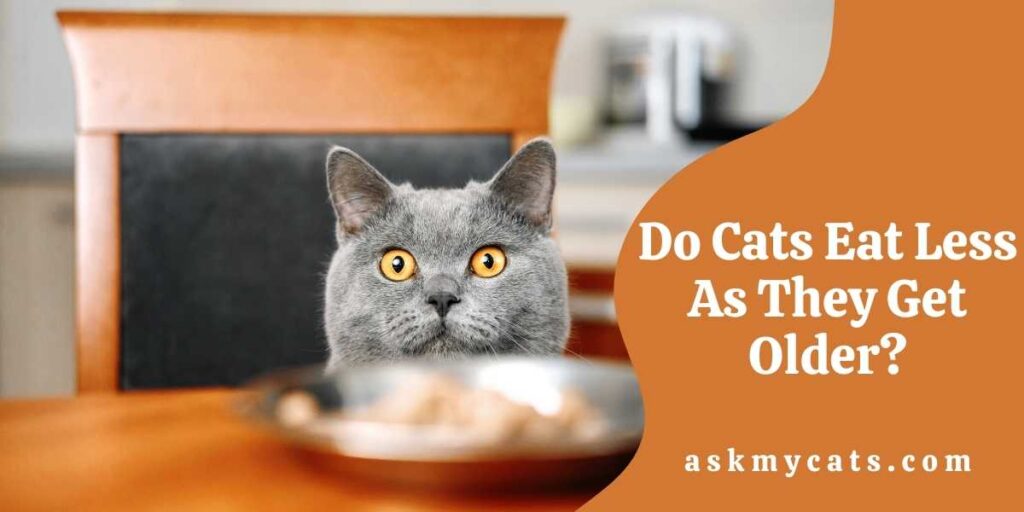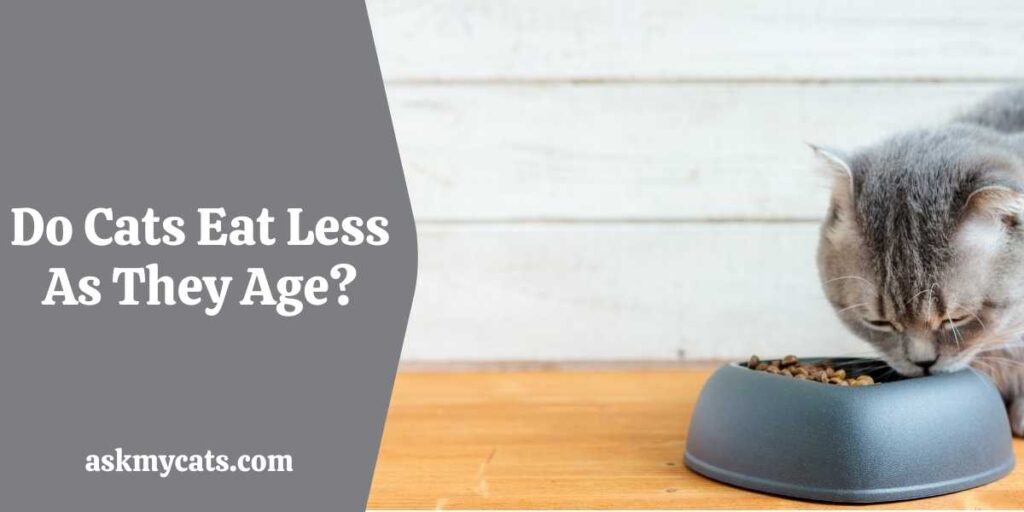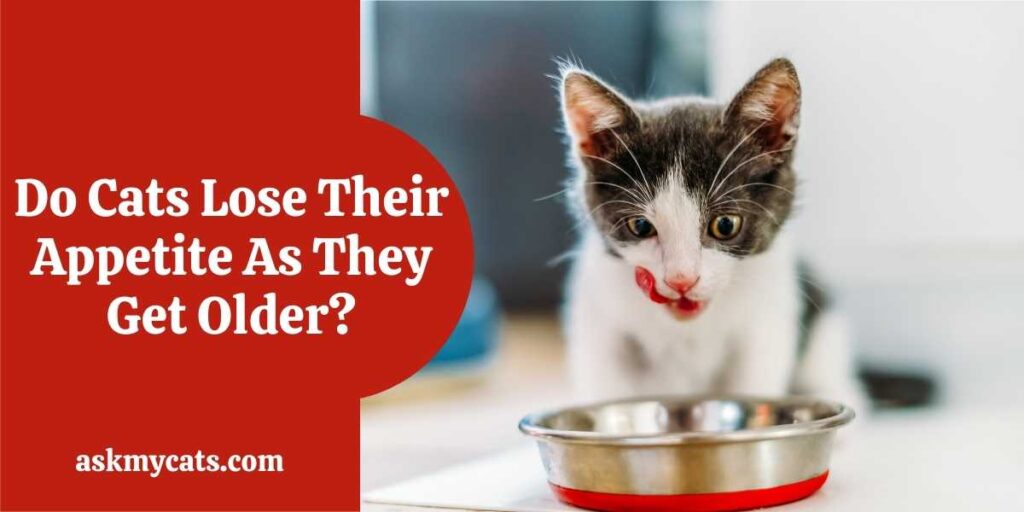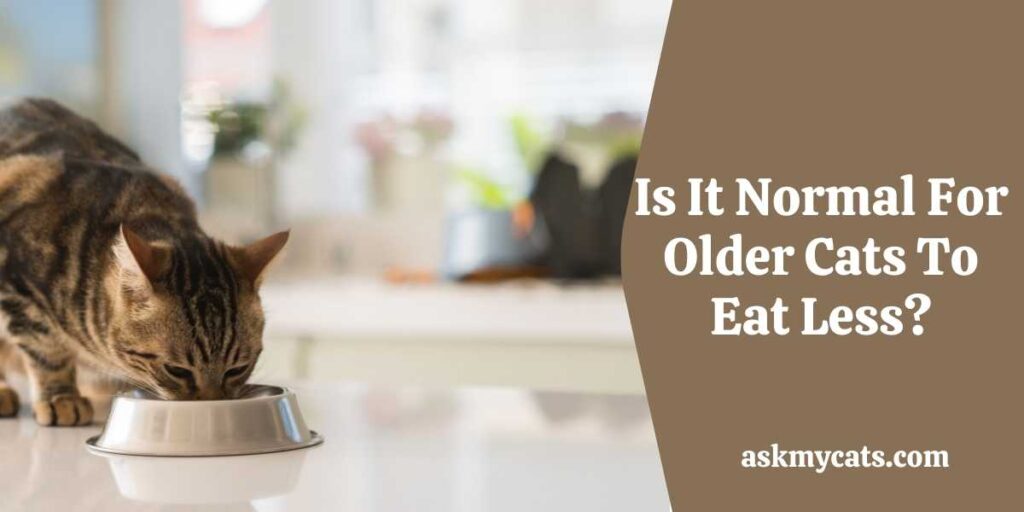A senior cat’s metabolism slows down, and they spend more time inside and is less active. All of this might happen as a result of their increased weight.
Similarly, when ageing cats approach their senior years, a decrease in their appetite and sickness can influence their lifestyle and, in turn, their general health.
Your cat may eat less or more as it gets older, depending on its individual health. If a senior cat is in good health, it will require between 280 and 360 calories per day.
An elderly cat’s specific requirements are determined by their regular lean weight. Some elderly cats require more cat food than others, which may surprise you.


Give Your Cat the Perfect Day
Get the Free Ebook!
Do Cats Eat Less As They Age?
Cats will eat as per their nutritional requirements when they age. They can eat more or less food based on their mood.

Cats’ dietary requirements change as they become older. Given that your feline companion will spend nearly 40% of his senior life on your lap, you must provide him with the proper nutrition for him to remain healthy and active.
During your cat’s senior years, he needs to consume a delicious, high-quality diet with a careful mix of nutrients and easy-to-digest protein more than ever.
A decent feline diet may give a balanced amount of lipids, high-quality protein, and easy-to-digest carbohydrates for energy. Along with proteins, important minerals for ageing joints and vitamins may all help your cat’s immune system age gracefully.
Cats’ appetites and how much food they eat are not affected by their age, but their lifestyle can significantly influence them.
Cats, by nature, are hunters. They hunt and stalk their prey, eating whatever they catch each day.
On the other hand, nowadays, many felines are kept indoors with little space to wander and, in most cases, the food dish is easily available anytime they want to eat.
Apart from the relatively sedentary lifestyle of today’s domestic cats, they are frequently fed calorie-dense meals. The calorie level of kibble or dry cat food is extremely high. And, given a cat’s tiny stature, even a few additional calories each day may soon mount up.
Do Cats Lose Their Appetite As They Get Older?
Cats can lose their appetite when they get older.

As long as your senior cat does not have any underlying health concerns or your veterinarian has instructed you differently, it is typically recommended that you switch them to a specially made older cat food instead of a regular cat diet.
Furthermore, senior cat diets can include high-quality protein and extra Vitamin E, which can help your cat’s natural defences.
Most significantly, senior cat chow has fewer calories, which helps your cat maintain a healthy weight when their activity levels decline with age. It implies that your cat may continue to enjoy his meals without jeopardising his health.
As cats age, their senses of taste and smell, as well as their chewing skills, may deteriorate. Softer, smaller pieces might assist your aged cat in obtaining the most nutrients from his meals, especially if he has sensitive lips due to tooth loss.
Aside from that, a larger meat content can make your cat’s food taste and smell better, making it more enticing and edible.
When starting a new diet, it’s important to do it carefully. You can begin by feeding your ageing cat both the new and old diets simultaneously, gradually increasing the proportions over one to ten days until you’re exclusively giving your ageing cat specialist senior cat food.
It’s natural for felines’ feeding habits and appetites to vary as they become older. In reality, some senior cats lose interest in cat food they previously adored, while others eat less often than they did when they were younger. Older cats that aren’t eating or aren’t eating at all and are losing weight might be concerning.
Is It Normal For Older Cats To Eat Less?
It is normal for older cats to eat less.

Cats’ personalities and physical characteristics vary as they get older. As the cat’s age progresses, these changes necessitate expert cat breeders caring for them more correctly.
Even if they have visited a veterinarian, not everyone recognises the right moment to act.
Cats are sensitive creatures who want to hide. They will make it difficult for you to notice their health concerns. Instead, they altered a few behaviours or attitudes discreetly. There is no exemption when it comes to eating and drinking.
Several indicators and quick changes might help you determine where your cat is sensitive.
According to some experts, cats reach old age during the eleventh year of their lives. That is, however, just in theory. Some cats eat well, play well, and appear in good health. They may only show signs of ageing in terms of their age, but their bodies may not.
The cat’s fur gets longer and less lustrous than previously. Cats will lose their flexibility as they become older. As a result, they will stop licking their feathers as much.
Cats are also susceptible to various ailments as they age, and their bodies are no longer as robust and supple as they once were. As a result, the cat’s coat is no longer attractive.
Cats are slower than dogs. We don’t observe the lateral degeneration inside the cat’s body. However, one of the visible indicators is that the cat’s movements have gotten more challenging. Because the cat’s joints are no longer flexible, it works at a considerably slower pace than previously.
Cats no longer sprint and jump, obstructing the use of stairwells. This habit in cats might also be explained by bone and joint disorders.
Cats sleep more than dogs. Older cats, according to studies, like to sleep more throughout the day. You could notice that their eyes are dull and that they spend much of their time in their small residence sleeping.
Many cat behaviour specialists feel this is because cats have lived long enough to grasp what they require rather than competing for anything. It is a secure and tranquil environment.
Why Is My Older Cat Eating Less?
Your older cat is eating less due to a low appetite.
A cat’s life is divided into three stages: kittenhood, maturity, and old age. Cats’ dietary requirements change as they progress through different phases of growth. However, there is no certainty that cats would consume less or more depending on their developmental stage.
When it comes to dogs, as they become older, they will eat less. However, this is not the case for cats. As your cat gets older, it may consume less or more, depending on its unique health.
When their food is soft and moistened, older cats may consume more. Furthermore, high-meat dishes are a good option since they enhance the food’s flavour, making it more enticing.
In any case, research suggests that as cats age, they consume less. In other words, your cat appetites diminish as you get older. An aged cat’s hunger is frequently caused by illness.
At What Age Do Cats Start Eating Less?
Cats start eating less after becoming 11 years.
Your cat’s nutritional requirements alter as it ages, either because its body absorbs nutrients differently or because it exercises more or less.
It might also grow more susceptible to age-related illnesses like diabetes and arthritis. As a result, selecting the right cat food for your pet’s life stage is critical.
How Much Should An Older Cat Eat?
As long as they’re healthy, most senior cats’ caloric requirements will be similar to those of an adult cat—roughly 280 to 360 daily calories depending on average lean weight. The energy requirements of certain senior cats will grow.
Cats spend a whopping 40% of their life as elderly citizens. This era of life begins at the age of seven and is marked by various bodily changes, including a drop in activity levels and a slower metabolism, all of which may be countered with the correct diet.
Small, pleasant meals that are simple to digest, low in fat, low in calories, and high in high-quality protein are required for your senior cat. Wet food or little bits of kibble may be more pleasant at this age due to dental issues.
To reduce renal strain, some senior diets include less salt and phosphorus and vitamins C and E to enhance immunity. Omega-3 and -6 fatty acids are also necessary for maintaining healthy skin and lustrous hair.
How Can I Increase My Older Cat’s Appetite?
You can increase your old cat’s appetite by providing him with a good nutritional diet.
Cats’ dietary requirements fluctuate as they age. Nutritional supplements can help your cat live longer while also reducing the growth of some ailments.
According to research, elder cats have difficulties digesting fat and protein, but kittens’ delicate digestive tract allows for improved fat and protein absorption. It also implies that elderly cats will absorb these two nutrients and obtain the energy they require.
The protein needs of cats are higher than those of many other animals. Cats’ immunological function might be harmed by a lack of protein in their diet.
In senior cats, this needs significantly more attention. If your cat’s health necessitates it, it’s better if you don’t put them on a protein-restricted diet with them.
For elderly cats, there are dry and canned meals available. They not only give high-quality protein, but some of them also include vitamin E to help your pet’s natural defences. They have fewer calories than typical meals, for instance. When your pet’s activity level decreases, this helps them maintain their ideal body weight.
If your cat is anorexic, provide it with smaller, softer foods. That’s a smart idea because cats’ scent, taste, and chewability will deteriorate as they age.
As senior cats might be overwhelmed by excessive food consumption, such meals are even more useful in inciting them to overeat. More than three meals each day are permissible for your cat.
Frequently Asked Questions
Do cats need more food as they get older?
Calorie restriction in mature and elderly cats generally entails a 20-30% reduction in calorie consumption. As their body condition and weight gradually diminish with advanced age, it may be more vital to boost their calorie intake in elderly cats to maintain a regular physique.
What does it mean when an old cat wants to eat all the time?
The normal changes that occur with age might also make a cat always hungry. Animals’ capacity to digest fat and protein declines as they age, but their energy requirements rise, with the transition occurring about age 13 in cats.
Why do old cats get skinny?
Chronic renal illness, diabetes mellitus, hyperthyroidism, inflammatory bowel disease (IBD), exocrine pancreatic insufficiency, and dental difficulties are well-known causes of weight loss in older cats. In older cats, dental problems can lead to weight loss.
Final Words
Cats will eat less or more based on their capacity and appetite as they become old. Senior cats should be fed a dry diet with a fat content of 10% to 28% protein or wet food with a fat content of 4% to 8% protein. As animals age, their metabolism slows, necessitating fewer calories and fat in their diets.
As your cat gets older, it may also be a good move to purchase a pet insurance policy. While your cat may not have health problems now, it’s possible they may in the future, so it’s best to purchase a policy before these problems become “preexisting conditions” as determined by insurance companies.
Ask your questions in the comments section below.
